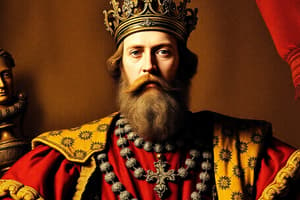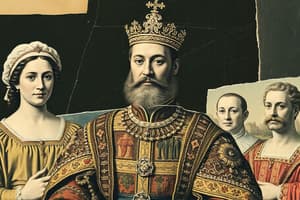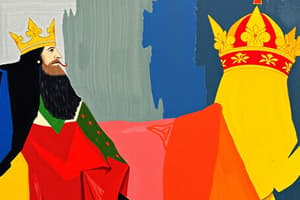Podcast
Questions and Answers
What did France do during the 1600s in contrast to England's shift of power to an elected parliament?
What did France do during the 1600s in contrast to England's shift of power to an elected parliament?
France put more power in the hands of its monarchy.
What did Spain, France, and Russia have in common during the 1500s and 1600s?
What did Spain, France, and Russia have in common during the 1500s and 1600s?
They all had absolute rulers who built strong, central governments.
Which of these statements best describes absolute rulers?
Which of these statements best describes absolute rulers?
- They have checks on their power.
- They consult with a parliament.
- They have no checks on their power. (correct)
- They are elected by the people.
What did the weakening of the Catholic Church's power in Europe during the 1500s and 1600s lead to?
What did the weakening of the Catholic Church's power in Europe during the 1500s and 1600s lead to?
Why did Peter the Great call his new capital city a 'window on Europe'?
Why did Peter the Great call his new capital city a 'window on Europe'?
How did Peter the Great reduce the power of the boyars?
How did Peter the Great reduce the power of the boyars?
What was the result of Louis XIV's constant pursuit of warfare?
What was the result of Louis XIV's constant pursuit of warfare?
Who suffered when Louis XIV revoked the Edict of Nantes?
Who suffered when Louis XIV revoked the Edict of Nantes?
When Louis XIV said, 'I am the state,' what did he mean?
When Louis XIV said, 'I am the state,' what did he mean?
What does someone who believes in divine rule believe?
What does someone who believes in divine rule believe?
Flashcards are hidden until you start studying
Study Notes
Absolute Monarchy Overview
- The 1600s saw a shift in England towards parliamentary power, contrasting with France's enhancement of monarchical authority.
Common Features of Absolute Monarchies
- Spain, France, and Russia during the 1500s and 1600s were characterized by absolute rulers who established strong central governments with unchecked power.
Characteristics of Absolute Rulers
- Absolute rulers operate without checks on their authority, allowing them to wield complete power over their states.
Impact of Catholic Church's Decline
- The Catholic Church's diminishing influence in the 1500s and 1600s facilitated the rise of kings and queens, strengthening monarchy in Europe.
Peter the Great's Vision
- Peter the Great envisioned his capital, St. Petersburg, as a "window on Europe" to embody and reflect European culture and advancement.
Noble Reforms by Peter the Great
- To reduce the boyars' (nobility) influence, Peter introduced a merit-based system, promoting individuals based on ability rather than noble birth.
Consequences of Louis XIV’s Military Campaigns
- Louis XIV's aggressive warfare strategies ultimately led to significant national debt for France, straining its economy.
Revocation of the Edict of Nantes
- The revocation of the Edict of Nantes primarily affected French Protestants, leading to their persecution and exile.
Louis XIV's Assertion of Power
- Louis XIV's declaration "I am the state" embodied his belief in absolute monarchy, signifying that he embodied the state and its governance.
Beliefs in Divine Right
- The concept of divine rule posits that God selects monarchs to act as his earthly representatives, justifying their authority and governance.
Studying That Suits You
Use AI to generate personalized quizzes and flashcards to suit your learning preferences.




